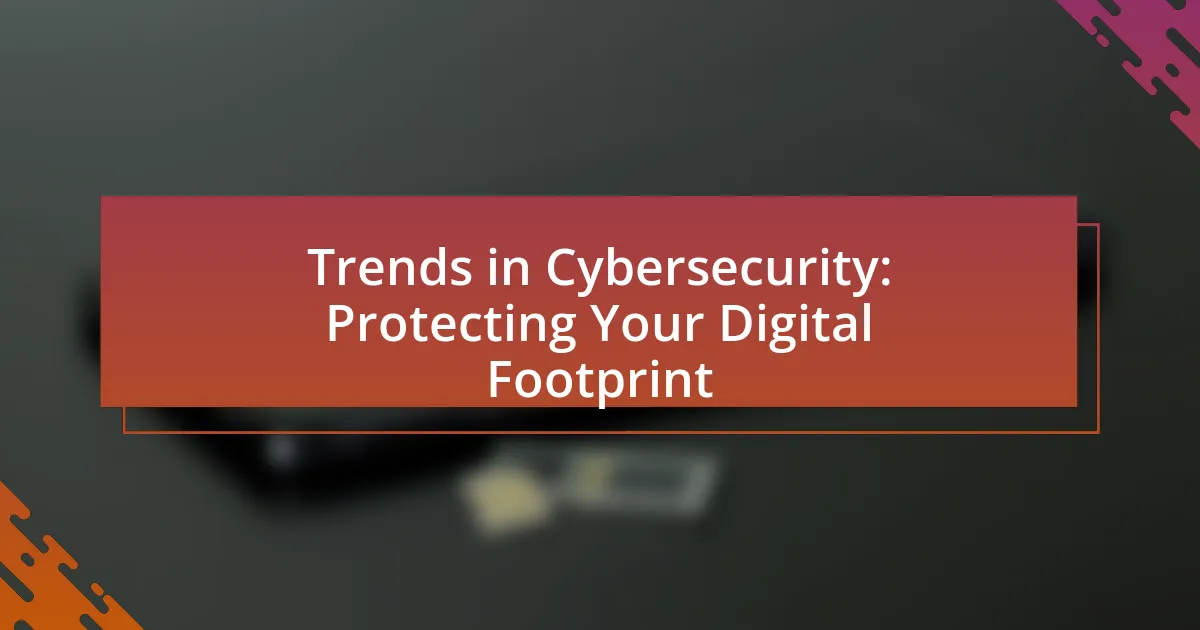Blockchain is a decentralized digital ledger technology that enhances internet privacy by securely recording transactions across multiple computers, thereby preventing unauthorized access and data breaches. This article explores how blockchain functions, its key components, and the mechanisms through which it improves privacy, such as decentralization, encryption, and pseudonymity. It also addresses the importance of internet privacy in the digital age, the threats to personal data, and the limitations of current privacy solutions. Furthermore, the article examines real-world applications of blockchain in various industries, the challenges faced in implementing privacy solutions, and best practices for leveraging blockchain technology to protect user information.

What is Blockchain and How Does it Relate to Internet Privacy?
Blockchain is a decentralized digital ledger technology that securely records transactions across multiple computers, ensuring that the recorded data cannot be altered retroactively. This technology enhances internet privacy by providing users with greater control over their personal data, as transactions can be conducted without the need for intermediaries, reducing the risk of data breaches and unauthorized access. For instance, blockchain’s cryptographic security measures protect user identities and transaction details, making it difficult for third parties to track or manipulate personal information. Additionally, studies have shown that blockchain can facilitate privacy-preserving solutions, such as zero-knowledge proofs, which allow verification of information without revealing the underlying data, further reinforcing user privacy online.
How does blockchain technology function?
Blockchain technology functions as a decentralized digital ledger that records transactions across multiple computers in a way that ensures the security and transparency of the data. Each transaction is grouped into a block, which is then linked to the previous block, forming a chain. This structure prevents alteration of any single block without changing all subsequent blocks, thereby enhancing data integrity. The consensus mechanism, such as Proof of Work or Proof of Stake, validates transactions and maintains the network’s security by requiring participants to agree on the validity of transactions before they are added to the blockchain. This decentralized approach eliminates the need for a central authority, making it resistant to fraud and tampering.
What are the key components of blockchain technology?
The key components of blockchain technology are decentralization, transparency, immutability, and security. Decentralization allows data to be stored across a network of computers, reducing the risk of a single point of failure. Transparency ensures that all transactions are visible to participants, fostering trust among users. Immutability means that once data is recorded on the blockchain, it cannot be altered or deleted, which enhances data integrity. Security is achieved through cryptographic techniques that protect data from unauthorized access and tampering. These components collectively enable blockchain to function effectively, supporting applications in various sectors, including finance and supply chain management.
How does decentralization enhance privacy in blockchain?
Decentralization enhances privacy in blockchain by distributing data across a network of nodes rather than storing it in a single location. This distribution makes it significantly harder for any single entity to access or control all the data, thereby reducing the risk of data breaches and unauthorized surveillance. For instance, in a decentralized blockchain, user identities are often pseudonymous, meaning that personal information is not directly tied to transactions, further protecting user privacy. Additionally, the use of cryptographic techniques in decentralized systems ensures that even if data is intercepted, it remains unreadable without the appropriate keys. This structure contrasts with centralized systems, where a single point of failure can lead to widespread data exposure.
Why is internet privacy important in today’s digital age?
Internet privacy is crucial in today’s digital age because it protects individuals’ personal information from unauthorized access and misuse. With the rise of data breaches, identity theft, and surveillance, maintaining privacy ensures that sensitive data, such as financial details and personal communications, remains secure. According to a 2021 report by Cybersecurity Ventures, cybercrime is projected to cost the world $10.5 trillion annually by 2025, highlighting the urgent need for robust internet privacy measures. Furthermore, the General Data Protection Regulation (GDPR) implemented in the European Union emphasizes the importance of data protection and privacy rights, reinforcing that individuals should have control over their personal information in an increasingly interconnected world.
What are the main threats to internet privacy?
The main threats to internet privacy include data breaches, surveillance, and tracking. Data breaches occur when unauthorized individuals access sensitive information, affecting millions; for instance, the 2017 Equifax breach exposed personal data of 147 million people. Surveillance by governments and corporations compromises privacy, as seen in the revelations by Edward Snowden regarding mass data collection practices. Tracking by websites and advertisers utilizes cookies and other technologies to monitor user behavior, leading to a loss of anonymity online. These threats collectively undermine individuals’ control over their personal information and privacy.
How do current privacy solutions fall short?
Current privacy solutions fall short primarily due to their reliance on centralized systems, which create single points of failure and vulnerability to data breaches. For instance, traditional data storage methods expose user information to unauthorized access, as evidenced by the 2020 Verizon Data Breach Investigations Report, which indicated that 86% of breaches were financially motivated and often exploited centralized databases. Additionally, many privacy solutions lack transparency and user control over personal data, leading to a trust deficit among users. According to a 2021 survey by the Pew Research Center, 79% of Americans expressed concern about how their data is being used by companies, highlighting the inadequacy of current solutions in addressing user privacy concerns effectively.

How Can Blockchain Improve Internet Privacy?
Blockchain can improve internet privacy by enabling decentralized data storage and enhancing user control over personal information. This technology allows users to manage their own data without relying on centralized entities, reducing the risk of data breaches and unauthorized access. For instance, blockchain’s cryptographic features ensure that data is securely encrypted and only accessible to authorized parties. According to a report by the World Economic Forum, blockchain can provide a more secure framework for identity management, which is crucial for protecting personal information online. This decentralized approach not only enhances privacy but also fosters trust among users, as they have greater transparency and control over their data.
What are the mechanisms through which blockchain enhances privacy?
Blockchain enhances privacy primarily through mechanisms such as cryptographic techniques, decentralized architecture, and pseudonymity. Cryptographic techniques, including hashing and encryption, secure transaction data, ensuring that sensitive information remains confidential and tamper-proof. The decentralized architecture of blockchain eliminates the need for a central authority, reducing the risk of data breaches and unauthorized access. Pseudonymity allows users to interact on the blockchain without revealing their real identities, further protecting personal information. These mechanisms collectively contribute to a more secure and private online environment, as evidenced by the increasing adoption of blockchain in sectors requiring stringent privacy measures, such as finance and healthcare.
How does encryption play a role in blockchain privacy?
Encryption is fundamental to blockchain privacy as it secures transaction data and user identities. In blockchain systems, cryptographic techniques such as hashing and public-key cryptography ensure that sensitive information remains confidential and tamper-proof. For instance, hashing transforms transaction details into a fixed-size string of characters, making it nearly impossible to reverse-engineer the original data. Additionally, public-key cryptography allows users to generate a pair of keys, where the public key encrypts data and the private key decrypts it, ensuring that only intended recipients can access the information. This dual-layer of encryption not only protects individual privacy but also enhances the overall integrity of the blockchain, as evidenced by the widespread adoption of these methods in cryptocurrencies like Bitcoin and Ethereum.
What is the significance of pseudonymity in blockchain transactions?
Pseudonymity in blockchain transactions is significant because it allows users to engage in financial activities without revealing their real identities, thus enhancing privacy. This characteristic protects users from surveillance and data breaches, as their transactions are linked to cryptographic addresses rather than personal information. For instance, Bitcoin transactions are recorded on a public ledger, but the identities behind the wallet addresses remain concealed, which helps mitigate risks associated with identity theft and fraud. Additionally, studies indicate that pseudonymity can foster trust in decentralized systems, as users can transact without fear of being tracked or targeted by malicious actors.
What are the potential challenges of using blockchain for privacy?
The potential challenges of using blockchain for privacy include the immutability of data, transparency of transactions, and the risk of de-anonymization. Immutability means that once data is recorded on the blockchain, it cannot be altered or deleted, which poses a risk if sensitive information is mistakenly published. Transparency allows anyone to view transaction details, which can lead to the exposure of personal information if not properly managed. Additionally, techniques such as blockchain analysis can de-anonymize users by linking their transactions to real-world identities, undermining the privacy that blockchain technology aims to provide. These challenges highlight the need for enhanced privacy measures in blockchain implementations.
How does scalability affect blockchain’s effectiveness in privacy?
Scalability significantly impacts blockchain’s effectiveness in privacy by influencing the ability to process transactions while maintaining confidentiality. As blockchain networks grow and handle more transactions, the increased data load can lead to slower processing times and higher costs, which may incentivize the use of less private solutions, such as public ledgers. For instance, in Bitcoin, the need for scalability has led to proposals like the Lightning Network, which aims to facilitate faster transactions but may compromise the anonymity of users by creating off-chain transactions that are not fully recorded on the blockchain. This trade-off highlights that as scalability improves, the mechanisms to ensure privacy must also evolve to prevent potential exposure of user data.
What are the legal implications of blockchain privacy solutions?
Blockchain privacy solutions raise significant legal implications primarily related to data protection, compliance with regulations, and liability issues. These solutions often involve the use of cryptographic techniques to enhance user privacy, which can conflict with legal frameworks such as the General Data Protection Regulation (GDPR) in Europe, which mandates the ability to access and delete personal data. For instance, the GDPR’s right to be forgotten may be challenged by the immutable nature of blockchain technology, as data once recorded cannot be easily altered or removed. Additionally, the use of privacy coins, which obscure transaction details, can attract scrutiny from regulators concerned about money laundering and tax evasion, leading to potential legal repercussions for users and developers. Furthermore, jurisdictions may impose varying legal standards on blockchain applications, creating a complex landscape for compliance.

What are Real-World Applications of Blockchain in Enhancing Internet Privacy?
Real-world applications of blockchain in enhancing internet privacy include decentralized identity management, secure data sharing, and privacy-preserving transactions. Decentralized identity management allows users to control their personal information without relying on centralized authorities, reducing the risk of data breaches. For instance, projects like SelfKey and uPort enable individuals to manage their identities securely on the blockchain. Secure data sharing utilizes blockchain’s immutable ledger to ensure that data is only accessible to authorized parties, as seen in healthcare applications where patient data can be shared securely among providers while maintaining privacy. Privacy-preserving transactions, exemplified by cryptocurrencies like Monero and Zcash, employ advanced cryptographic techniques to obscure transaction details, ensuring user anonymity. These applications demonstrate how blockchain technology can significantly enhance internet privacy by providing users with greater control over their data and reducing vulnerabilities associated with centralized systems.
How are companies currently utilizing blockchain for privacy protection?
Companies are currently utilizing blockchain for privacy protection by implementing decentralized identity solutions that allow users to control their personal data. For instance, organizations like Microsoft and IBM are developing blockchain-based identity systems that enable individuals to manage their credentials without relying on centralized databases, thereby reducing the risk of data breaches. Additionally, blockchain’s inherent encryption and immutability features ensure that sensitive information remains secure and tamper-proof, which is crucial for maintaining user privacy. These applications demonstrate how blockchain technology can enhance privacy by giving users greater control over their data and minimizing exposure to unauthorized access.
What industries are leading the way in blockchain privacy solutions?
The finance and healthcare industries are leading the way in blockchain privacy solutions. In finance, companies are utilizing blockchain technology to enhance transaction security and protect sensitive customer data, with firms like JPMorgan and Fidelity exploring private blockchain networks. In healthcare, organizations are implementing blockchain to secure patient records and ensure data integrity, as seen in initiatives by companies like Guardtime and MedRec, which focus on maintaining patient privacy while allowing authorized access to medical data. These industries are at the forefront due to their critical need for data security and regulatory compliance.
How do blockchain-based identity solutions work?
Blockchain-based identity solutions work by utilizing decentralized ledgers to securely store and manage digital identities. Each identity is represented as a unique cryptographic key, allowing individuals to control their personal information without relying on a central authority. This decentralized approach enhances privacy and security, as users can selectively share their data with trusted parties while maintaining ownership. For instance, a study by the World Economic Forum highlights that blockchain can reduce identity fraud by providing immutable records that are verifiable and tamper-proof.
What lessons can be learned from existing blockchain privacy projects?
Existing blockchain privacy projects demonstrate the importance of balancing transparency and confidentiality. These projects, such as Monero and Zcash, utilize advanced cryptographic techniques like zero-knowledge proofs to ensure transaction privacy while maintaining network integrity. For instance, Monero employs ring signatures and stealth addresses, which obscure sender and receiver identities, highlighting the effectiveness of privacy-enhancing technologies in fostering user anonymity. Additionally, the challenges faced by these projects, such as regulatory scrutiny and scalability issues, underscore the need for continuous innovation and adaptation in privacy solutions. These lessons emphasize that successful blockchain privacy implementations require robust technical frameworks and an understanding of the evolving regulatory landscape.
What successes have been achieved in blockchain privacy initiatives?
Blockchain privacy initiatives have achieved significant successes, particularly through the development of privacy-focused protocols and technologies. Notable advancements include the implementation of zero-knowledge proofs, which allow transactions to be verified without revealing sensitive information, exemplified by projects like Zcash and Monero. These cryptocurrencies utilize advanced cryptographic techniques to ensure transaction confidentiality while maintaining network integrity. Additionally, the introduction of privacy layers on existing blockchains, such as the Lightning Network for Bitcoin, has enhanced user privacy by enabling off-chain transactions that obscure transaction details. These initiatives demonstrate a growing commitment to enhancing user privacy in the blockchain space, addressing concerns about data exposure and surveillance.
What failures or setbacks have been encountered in these projects?
Failures and setbacks encountered in blockchain projects related to internet privacy include scalability issues, regulatory challenges, and user adoption barriers. Scalability issues arise as many blockchain networks struggle to handle a high volume of transactions efficiently, leading to slow processing times and increased costs. For instance, Ethereum has faced congestion problems during peak usage, impacting its ability to serve privacy-focused applications effectively. Regulatory challenges stem from varying legal frameworks across jurisdictions, which can hinder the deployment of blockchain solutions and create uncertainty for developers and users. Additionally, user adoption barriers exist due to the complexity of blockchain technology, which can deter non-technical users from engaging with privacy-enhancing applications. These factors collectively impede the progress and effectiveness of blockchain in enhancing internet privacy.
What best practices should be followed when implementing blockchain for privacy?
When implementing blockchain for privacy, best practices include utilizing encryption techniques, implementing permissioned access, and ensuring data minimization. Encryption techniques, such as zero-knowledge proofs, allow transactions to be verified without revealing sensitive information, enhancing privacy. Permissioned access restricts who can view or interact with the data, thereby protecting user identities and transaction details. Data minimization involves collecting only the necessary information for transactions, reducing the risk of exposing personal data. These practices are supported by the increasing adoption of privacy-focused blockchain solutions, such as Monero and Zcash, which prioritize user anonymity and data protection.




